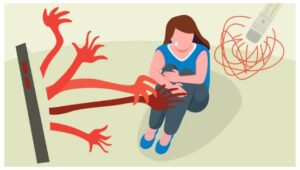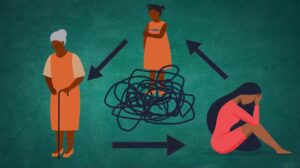Eye Movement Desensitization and Reprocessing (EMDR) Therapy is a structured therapy that encourages patients to briefly focus on the trauma memory while simultaneously experiencing bilateral stimulation (typically eye movements), associated with a reduction in the vividness and emotion associated with the trauma memories. This technique of therapy was initially developed for the patients of Post-Traumatic Stress Disorder (PTSD) in order to help them recover from their trauma and its impairing effects.
The concept behind this technique is based on the assumption that patients with PTSD keep re-experiencing the traumatic memories with the same intensity because those memories were not processed before. EMDR in India is a highly used therapy for not only patients with PTSD but also other traumatic experiences along with Anxiety, Depression, Addictions, Behavioral difficulties, Relationship issues, Psychosis, and Personality disorders.
How is EMDR different from other therapies?
EMDR, India follows a different approach while dealing with traumatic life experiences and memories. Unlike other therapeutic techniques and methods that focus on altering the feelings, emotions, and thoughts generated by the traumatic event and individuals can help process those experiences, EMDR India therapy focuses on traumatic memory and the way it is stored in the brain. This way it helps reduce and eliminate the symptoms caused by the traumatic memories.
How long does the treatment go for?
Eye Movement Desensitization and Reprocessing therapy is conducted individually on every patient. This treatment is typically administered one to two times per week for a total of six to twelve sessions. However, research has shown that some people were found to show significant positive effects of the delivery of EMDR after just a few sessions. Sessions can be conducted on consecutive days as well, depending on the severity of the problems and the diagnosis of the issue.
How does EMDR India work?
EMDR, India, and worldwide typically uses an eight-phase approach to go about treating patients with trauma. These phases include –
- Phase 1 – History Taking
A full case history taken by the psychologist is a must for any kind of diagnosis and treatment planning. However, for identifying the main triggers and targets for the EMDR, India therapy the therapist and the patient work together to identify targets that may include past memories, current triggers, and future goals of the treatment/therapy.
- Phase 2 – Preparing the Client
In this phase, the therapist explains the procedure to the client and prepares the client for the therapy. The therapist also makes sure that the client has enough resources to manage their emotions if it gets overwhelming for them. Likewise, they also practice the eye movement components before actual administration for smooth conduction of the therapy.
- Phase 3 – Assessing the Target Memory
In this phase of EMDR therapy, an assessment of the client is taken that activates the memories that have been targeted for resolution. Each of them is identified through a variety of components such as – image, cognition (thoughts), affect (emotions), and sensations. There are various assessment scales used for conducting the above assessments.
- Phase 4 to 7 – Processing the Memory to Adaptive Resolution
There is a cluster of steps included from phases 4 to 7 that encompass the major part of the treatment.
- Phase 4: desensitization – in this phase, the client focuses on the traumatic memory while engaging in instructed eye movements. The clients are asked by the therapist to express and report whatever new thoughts that emerge during this process. This process goes on in rounds until the client reports that the traumatic memory in target is no longer distressing for them.
- Phase 5: Installation – this phase focuses on reinforcing helpful beliefs and emotions that replace the negative ones. It plays a major role in strengthening positive beliefs and feelings and integrating new perspectives revolving around the target memory.
- Phase 6: Body Scan – in this phase, the client is asked to observe their physical response while simultaneously thinking about the traumatic memory as well as the positive cognition. This is done to identify any remaining/residual somatic distress. If anything distressful is reported by the client, the same is addressed by using standard procedures.
- Phase 7: Closure – this hints at the end of the session. If the targeted memory was not fully processed, then specific instructions and techniques are provided to the client to ensure their safety until the next session.
- Phase 8 – Evaluating Treatment Results
Re-evaluation is the first step of the next session when the client is asked about their current psychological state, treatment effects from the previous session, whether the effects were maintained, any new memories that may have emerged since then, and so on. The purpose of this is to identify the targets of the current session.
Why CoachForMind?
- Experienced Psychologists: We are a team of licensed RCI-registered clinical psychologists. Our team is well-experienced in various forms of therapy such as CBT, DBT, EMDR, and Narrative Therapy.
- Personalized Approach: We are dedicated to treating our clients in the best-suited way, carefully curated as per the client’s needs, and adhering to one-on-one, client-centered therapy.
- Scientific Techniques: Our treatment plans and therapeutic methods are based on highly researched scientific findings such as CBT, DBT, EMDR and Narrative Therapy.
- Quality service: We at CoachForMind ensure quality services in our treatment regime and therapeutic approaches. Our clients hold the most value to us, so we ground our techniques in empathy while maintaining professionalism.
For more information, please visit our website or contact us directly at coachformind@gmail.com




